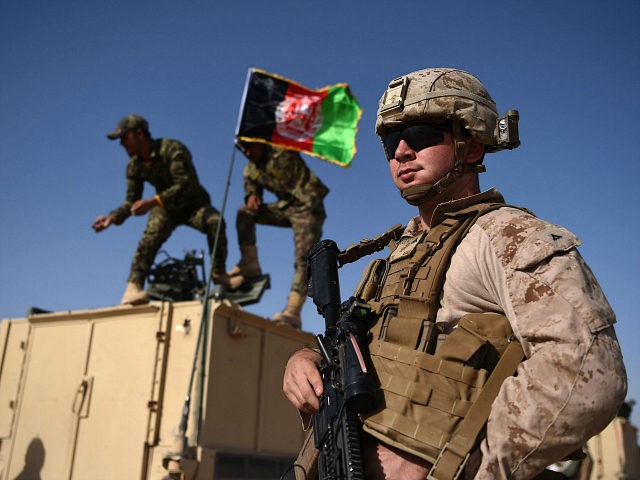WASHINGTON, DC – Russian and Iranian military aid to the Taliban is granting the jihadist group the option to delay or move ahead with any peace negotiations and ultimately gain more influence under a potential power-sharing arrangement with Kabul, indicated an analyst on Thursday.
During a panel discussion hosted by the U.S. Institute of Peace, Javid Ahmad, an Afghanistan analyst at the Atlantic Council think-tank, declared:
As long as weapons from Iran [and] specially Russia flow into [sic] the Taliban fighters, Taliban hardliners are … likely to gain a bigger advantage on the battlefield now, and those gains could easily be translated into the negotiating table, potentially affecting the outcome of any power-sharing arrangement with Kabul.
In a bigger picture, it could also further shift the balance of power away from the United States to Russia. The challenge here isn’t to bring the Taliban into [sic] the negotiating table, but how to make sure that they remain at the table.
Russia and Iran are providing the Taliban high-tech weapons that are giving the terrorists an edge over the U.S.-assisted Afghan National Defense and Security Forces (ANDSF), which include police and army units, claimed Ahmad, explaining:
Unlike in the past, the Taliban has become increasingly a potent group. Today, they leverage a variety of mobile special forces units—a Red Unit, as we’ve heard recently. They have access to and the use of a variety of sophisticated weapons sometimes even better than the Afghan forces have. This includes [armor], sniper weapons, drones, night-vision goggles, laser-guided M-4 rifles … some acquired, some provided by the Iranians and the Russians.
Now the only thing that they don’t have at this point is the air power, but imagine if they also get their hands on anti-aircraft missiles that are probably potentially supplied in the future by Iran or Russia.
For years, the Taliban has refused to engage in peace talks, arguing that they do not need to give in to any U.S. demands because they are winning, in part due to the assistance they are allegedly receiving from Russia as well as neighboring Iran and Pakistan, claims that all three countries deny.
According to the latest independent and U.S. government assessments, the Taliban controlled or contested about 45 percent of Afghanistan as of the end of September 2017.
As early as last month, the Pentagon acknowledged that the Taliban continues to benefit from assistance at the hands of Russia, Iran, and Pakistan.
At the end of 2016, an unnamed senior Taliban member told Reuters that the “sole purpose” of Russian ties with the terrorist group is to expel the U.S. from the region.
Similarly, disdain towards the U.S. military presence in Afghanistan has reportedly brought Shiite Iran together with the Sunni Taliban.
Meanwhile, Pakistan has long served as a sanctuary for the Afghan Taliban and other jihadist groups despite the billions of dollars it receives from the United States in aid, prompting U.S. President Donald Trump to suspend up to $1.9 billion in assistance.
The Trump administration has made bringing the Taliban to the peace negotiation table a significant tenet of his Afghanistan war strategy.
Trump’s South Asia strategy to end the war in Afghanistan is “determined” to pressure the Taliban into reconciliation and a political settlement with Kabul by making the jihadists realize they cannot win, U.S. Gen. John Nicholson, the top commander of American and NATO troops, said last August.
U.S. Ambassador to the United Nations Nikki Haley recently touted Trump’s strategy as a success, noting, “We are seeing that we’re closer to talks with the Taliban and the peace process than we’ve seen before.”
Americans have grown tired of the more than 16-year-old Afghanistan war, but there appears to be an appetite for a reconciliation agreement that would end the conflict and bring our troops home.
A survey fairly recently conducted by Conciliation Resources and Alliance for Peace Building found that 76 percent of Americans support peace talks between the American government and terrorist groups.
Ahmad believes reconciliation would be impossible without Pakistan’s blessing.
The Taliban has long maintained preconditions for peace negotiations to begin, particularly the pull-out of all foreign military troops.
Some of the experts who participated in the U.S. Institute for Peace discussion suggested that it is high time for America to put a “phased withdrawal” on the table as a bargaining chip to convince the Taliban to negotiate.
“The United State [needs] to make clear either publicly or at least privately … that it envisions that a negotiated settlement would entail a phased withdrawal of U.S. troops from Afghanistan as part of negotiations,” explained Laurel Miller, a senior political scientist at the RAND Corporation.
Dr. Alexander Ramsbotham, an expert at Conciliation Resources, agreed with the RAND analyst, saying: Putting the “conditionality of [a U.S.] military withdrawal framed within an objective of increasing leverage for a political solution … would affect the calculus of the parties on the ground” and promote a “political process.”
President Trump has refused to implement a withdrawal timetable, but the focus of his strategy is to end the war, which started in October 2001.
If the commander-in-chief succeeds in pressuring the Taliban into reconciliation with Kabul, he will be known as the president who ended America’s most protracted conflict by giving the American people what they want — U.S. military withdrawal, which happens to be what the Taliban has been asking for to end the conflict.
Referring to Trump’s Afghanistan strategy, Gen. Nicholson said in November, “In the face of this pressure, the Taliban cannot win. Their choices are to reconcile, live in irrelevance, or die.”

COMMENTS
Please let us know if you're having issues with commenting.